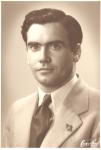Val Vallis is the son of a fisherman-wharfie, 'Michael', in many of his poems. Educated at the University of Queensland (MA) and London University (Ph.D.), Vallis served with the AIF from 1941 to 1946, his 'war poems' all based on his years in New Guinea. He met Tom Inglis Moore (q.v.) there, who was serving as major in the Army Education unit, and Vallis benefited from the older poet's advice. After the war Vallis was among a group detailed to Changi gaol to set up rehabilitative enquiry offices on the ships bringing home Australian ex-prisoners of war. Vallis's poem, 'The Ballad of Changi Chimes', recalls the day after most of the Australians had left, when the prison clock of its own accord began 'irresponsibly chiming'.
Before the war Vallis worked as a counter clerk with the Gladstone Town Council. He has said that in the writing of several sea lyrics he was 'indebted' to several poems, 'touchstones as it were': Charlotte Mew's 'Sea Love', Matthew Arnold's 'Dover Beach' and Tennyson's 'Break, Break, Break'. His 'first real recognition of the possibilities of converting landscape into poetry' began with reading the poetry of South African Lance Fallow, who was on the staff of the Rockhampton Morning Bulletin and who wrote poetry about local places.
From the time of being a student at Rockhampton High School, Vallis had wanted to be a teacher of English. Involved not only in writing, but also in opera and music, Vallis made a significant contribution to Australian arts and cultural life as a poet, author and scholar in a career spanning fifty years. Until his retirement he lectured in English and Philosophy at the University of Queensland. Apart from the works listed, Vallis also assisted Judith Wright (q.v.) in the selection of work for Witnesses of Spring: Unpublished Poems by Shaw Neilson.
